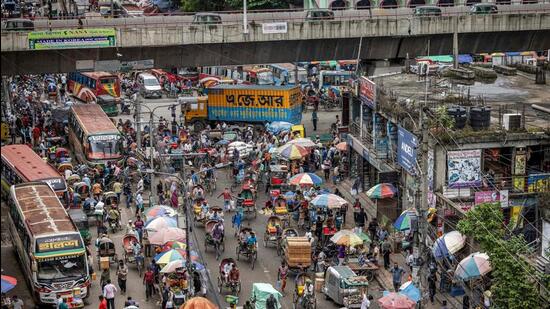Dhaka: India should reboot its relations with Bangladesh to reflect the wishes of the people of the neighbouring country and without basing them on any individual party or leader, analysts and former diplomats have said following the ouster of the Sheikh Hasina government in a student-led uprising.

Since Hasina stepped down and fled to India on August 5, the Indian government has faced accusations of tying bilateral relations completely to the Awami League leader and not doing enough to build ties with other political parties and civil society. Nobel laureate Muhammad Yunus, head of the interim government, has described Hasina’s regime as a “dictatorship” while Prime Minister Narendra Modi has said India will work with the caretaker administration.
Humayun Kabir, president of Bangladesh Enterprise Institute (BEI), a leading think tank, told HT: “I think we should not rely on a particular individual or party, it is best to keep good relations with all stakeholders. Bangladesh and India are close neighbours and will have to live side by side peacefully. India should keep a relationship as a neighbour, irrespective of the government.”
Kabir, a former diplomat who served as deputy high commissioner in Kolkata, said the uprising was “indigenously produced” and led by the youth, who echoed the spirit of the 1971 war of independence, including values such as democracy, equity, justice and transparency.
“But some of our Indian friends are feeling uncomfortable because they have been observing recent events in Bangladesh through a single lens. Somehow, they failed to take into consideration various shades of opinion, particularly those of the youth, who have suffered because of being deprived of their democratic rights and of fair opportunities for building their future,” he said.
When Yunus held his first phone conversation with Modi on August 16, the Indian leader reaffirmed New Delhi’s commitment to a democratic, stable, peaceful and progressive Bangladesh and emphasised the importance of ensuring the safety of Hindus and other minorities in the country.
However, Debapriya Bhattacharya, distinguished fellow at the Centre for Policy Dialogue (CPD), a Dhaka-based think tank, said it was no secret that New Delhi had extended “unconditional and exclusive support” to Hasina and her government. The manner of the change of government in Bangladesh was coupled with public expression of outrage towards India, he noted.
“Indeed, India now has to reboot its relationship with Bangladesh based on mutual respect and guided by a balanced agenda of bilateral interests,” Bhattacharya said. “Hopefully, India won’t keep its relationship with Bangladesh hostage to one political party in future. Bangladesh too needs to create an informed national consensus regarding its approach towards India,” he said.
Bhattacharya said he believes the narrative promoted by mainstream Indian media after Hasina’s ouster was “ill-informed and not helpful”. Early signs of the rebooting of relations can be traced to the phone call Modi and Yunus had, and Yunus’s participation in the Voice of Global South Summit hosted by India was a positive development.
“As the interim government settles down, there will be more opportunities to reflect on the past and look forward to a mutually beneficial relationship,” he said.
Shafqat Munir, senior fellow at the Bangladesh Institute of Peace and Security Studies, said there is a perception among Bangladeshi people that India is aligned with one individual and one political party. “It is urgently needed for India to signal to Dhaka and to the Bangladeshi people that it stands with the people, it stands with their aspirations,” he said.
Munir said it is critical for India and Bangladesh to have a constructive and productive relationship. “The new reality which has emerged in Bangladesh has to be accepted by India and a new chapter needs to begin,” he added.
“Relations between India and Bangladesh are between two countries. Prime ministers may come and go, the India-Bangladesh relationship must endure,” said Munir. “There needs to be a reset in the relationship.”
Munir suggested India could send a special envoy to Bangladesh with a message of goodwill to begin a new chapter because “a people’s revolution has taken place and needs to be recognised as a people revolution”.
Kabir, who did two diplomatic postings in India, said the fast pace of events appeared to thrown the Indian side into a state of confusion. India should appreciate people’s aspirations for democracy, justice and equity, and come forward with a positive mind to help them.
“If they do so, it will create a climate of understanding, which will help us to move forward in our relationship based on mutual respect, trust and benefits,” said Kabir.





